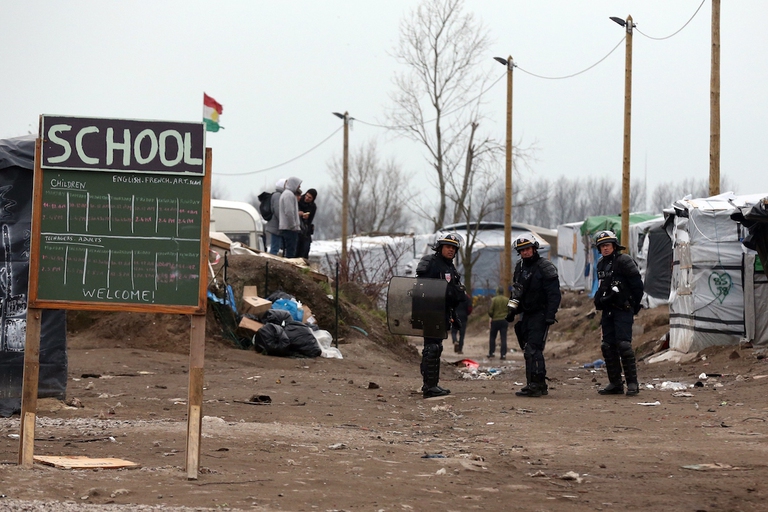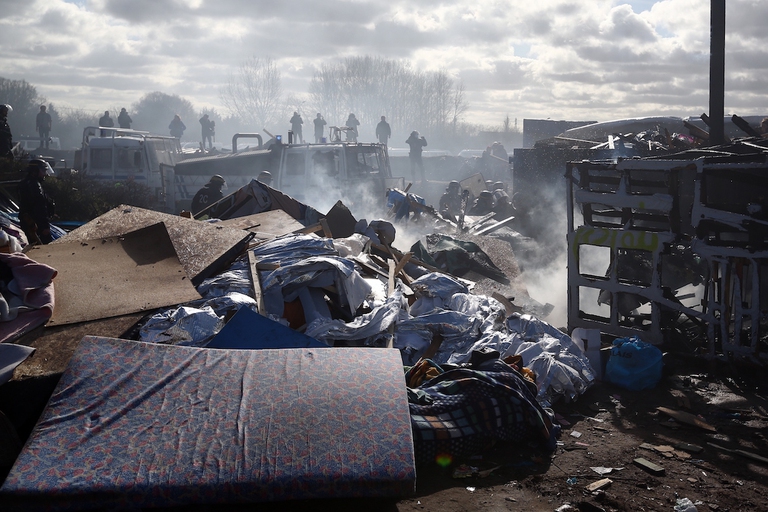
The Louise Michel is the humanitarian rescue ship saving lives in the Mediterranean. Financed by the artist Banksy, it has found a safe port in Sicily.
Marguerite Stern, militante del gruppo Femen, volontaria nella giungla di Calais, si è innamorata di un profugo. Ecco perché ha deciso di raccontare tutto.
“I started to help the Sudanese community in the Calais Jungle a few months ago. I taught French in a school for refugees in the shantytown. From time to time I went back to Paris. Once there, I cried. A lot. But I’ve always went back to Calais. I told to myself not to get involved. But I fell in love. It always happens in the most unexpected ways. And now I fear he will be taken away from me”. She is Marguerite Stern, French activist of Femen, famous for its topless feminist protesters.
Stern tells the story of her encounter with a Sudanese refugee to the newspaper L’Obs, starting from “the obstacle course to file the asylum application. We woke up at 5 a.m. to be at the offices at 6. We waited until the opening, at 9, along with dozens of migrants. They examined only about 30 files a day: who was late had to go back to the camp, and try the day after”.
“I was determined not to abandon my pupils, but I didn’t manage to do so. Meanwhile, I wondered what I was embarking on. I didn’t know whether I had to continue my activism, on the field, or offer a better life to the person who made my heart beat”. One day, finally, they got the appointment at the Immigration Office: “I told to myself that that was the last stage. In Sudan, he was persecuted for ethnical reasons, imprisoned and tortured. But he couldn’t prove it. His application was rejected”.
Marguerite’s boyfriend will appeal to the national court for the right to asylum. “This is praxis. It takes six to eight months for the final response. In the meanwhile, he lives in a facility for asylum seekers in Northern France. I’d like to take him with me to Marseilles, but he would lose the possibility of benefitting from state aids. Plus, he refuses to depend on me”. If authorities deny the refugee status, he will be forced to go back to his home country, and “maybe he will imprisoned again”.
What this story tells us – beyond the personal and intimate sequence of events – is that all refugees have a story, and it is tragic most of the time. “You don’t cross the Mediterranean if you have something to lose. Each asylum application conceals the hope of finally living a dignified life. Beyond political, economic and juridical implications there are personal dramas. The privilege we had of being born here shouldn’t lead us to reject those who hadn’t the same fate. Granting rights to refugees doesn’t deprive us from anything”.
“For this reason – she adds – I realised that by telling my story and sharing my pain and fear, all of you may understand”.
French authorities started the clearance of the camp on 29 February. The aim is dismantling the illegal camp and displacing refugees all over France. However, many of them don’t give in, they flee new centres and go back to Calais. In the hope that they finally manage to embark for their destination: the United Kingdom.
Siamo anche su WhatsApp. Segui il canale ufficiale LifeGate per restare aggiornata, aggiornato sulle ultime notizie e sulle nostre attività.
![]()
Quest'opera è distribuita con Licenza Creative Commons Attribuzione - Non commerciale - Non opere derivate 4.0 Internazionale.
The Louise Michel is the humanitarian rescue ship saving lives in the Mediterranean. Financed by the artist Banksy, it has found a safe port in Sicily.
Venezuelan refugees are vulnerable to the worsening outbreak in South America: while coronavirus doesn’t discriminate, it does affect some people more than others.
In the midst of India’s coronavirus lockdown, two dozen people lost their lives in a desperate bid to return home: migrant labourers forced to leave the cities where they worked once starvation began knocking at their doors.
Behrouz Boochani returned to being a free man during the course of this interview. The Kurdish writer was imprisoned by the Australian government in Papua New Guinea for six years.
The Global Compact for Safe, Orderly and Regular Migration was signed by 164 nations in Marrakech. This is what the non-binding agreement that encourages international cooperation stipulates.
The winners of the World Press Photo 2019 tell the stories of migrants in the Americas. From the iconic image of a girl crying on the border between Mexico and the United States to the thousands of people walking from Honduras towards a better life.
The Semìno project is a journey of discovery through different countries’ food habits, offering migrants employment opportunities and allowing us to enjoy the properties of vegetables from all over the world.
Travelling across the new route used by migrants to cross the Balkans and reach Trieste in Italy, a reportage that documents the social, economic and political changes of the countries along the way.
The countries hosting the most refugees aren’t the wealthy, Western ones. An overview by NGO Action Against Hunger reminds us that refugees and internally displaced people are far from being safe.









